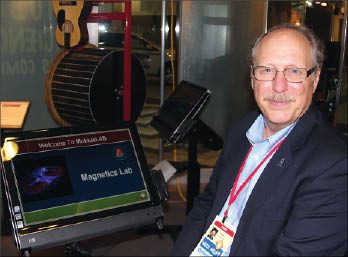
Home » Spokane resident develops museum software for Mobius
Spokane resident develops museum software for Mobius
Donated interface system senses visitors' preferences for customized experience

August 20, 2009
MobiusLab, a preview of the planned Mobius Science Center that's on exhibition at the NorthTown Mall, features a personalized touch-screen computer interface designed by a Spokane resident to bring exhibits to life in the minds of young visitors.
Through the interactive technology, called Passport to Discovery, each visitor obtains an identification tag and selects a virtual guide, or avatar, such as an animated wizard or genie. The avatar greets visitors, with their name popping up on a computer screen, as they approach each of six hands-on labs in the exhibition and offers age-appropriate explanations of scientific concepts demonstrated at the labs, says Charles Simon, a retired software developer and Mobius Spokane benefactor, who created the software.
Simon, a Spokane resident, donated the technology to Mobius Spokane, the umbrella organization for the lab, the science center, and Mobius Kids. Mobius Spokane plans to open a world-class science center in Riverfront Park in 2012, and Mobius Kids, a children's museum, operates in River Park Square downtown.
"This system was created to allow MobiusLab visitors to enjoy their exploration more by creating a totally customized and unique experience for them," Simon says.
The MobiusLab exhibition includes interactive labs that feature hands-on applications in the fields of audio, chaos, energy, geology, magnetics, and motion. In the audio lab, for instance, participants explore the nature of sound by translating the vibration patterns of musical strings into visible waves. In the chaos lab, a set of three connected pendulums demonstrates that a simple motion, such as the twist of a knob, can have complicated and unpredictable results.
Most of the labs are rented from Exploratorium, a science museum in San Francisco.
PassPort to Discovery replaces conventional museum signage with interactive screens, and it can be tailored to a student's grade level and targeted to a visitor's specific interests, Simon says.
The system tracks visitors' activities throughout MobiusLab, remembers their individual preferences, and encourages further progress each time a visitor returns to the exhibition, he says.
The system provides touch-screen choices for video presentations of real-life applications of the concepts as well as options to take brief quizzes to earn points for their respective schools, Simon says.
Certain activities earn varying numbers of points. Simon declines to describe the point system in detail. "Part of the challenge is to figure out what you're getting points for," he says.
Anne Marie Axworthy, a Mobius Spokane board member and Spokane-based Avista Corp.'s director of community development, says, "The PassPort enhances the learning process through a uniquely engaging experience using audio, video, animations, questions, points, and competition."
Axworthy says Simon's donation of the technology has the potential to provide income for Mobius Spokane if the organization can convince other museums to use the system on a fee basis.
Simon says the PassPort to Discovery system, among other uses, can gauge which activities or exhibits are most popular.
"It tracks where people go, what exhibits they see, and how much time they spend at them," Simon says. "It provides a true measure of how popular things are. That's extremely important."
Simon says he was inspired to design an entertaining system to encourage interest in science after he and his son attended a video-game convention in Seattle that drew tens of thousands of young people.
To operate a successful science center that stirs the interest of young people, Mobius should be in the entertainment business first, he contends.
"You can't require kids to be here," he says. "So the system is designed to be entertaining and, oh yes, you can't avoid learning something."
Simon says he approached the Mobius Spokane board of directors with the idea for the system and started creating the programming for PassPort to Discovery in March. He spent several 80-hour weeks working on the project, he says.
"That's the way I do things," he says.
About 10,000 visitors are expected to use the PassPort to Discovery system at the MobiusLab exhibition, which runs through Sept. 30.
Simon originally is from the San Francisco area, where he started programming IBM computers in Fortran, a computer language that resembles algebraic notation, while in high school. He earned a bachelor's degree in electrical engineering and computer science in 1975 from the University of California, Davis. At age 22, he founded a company that developed a computer-aided design system for creating printed circuitboards.
Simon moved to Spokane in 1987 and operated Abtek Computer Corp., a software development company. He later earned a master's degree in computer science from Washington State University at Spokane.
Simon currently lives in Spokane about six months a year and travels extensively abroad on his 46-foot sailboat the rest of the time.
Axworthy says Mobius Spokane has raised $11.3 million in funds needed for the planned 56,000-square-foot science center, which has a construction budget of $29.5 million. It is to be located on the north bank of the Spokane River at the Michael P. Anderson Plaza.
Simon, who has been associated with Mobius Spokane for about two years, says he sees a need to encourage more interest in education in scientific fields.
"There aren't many rocket scientists anymore," he says. "Most are retired."
He says colleges here aren't filling all of their technical spots, and jobs are being exported.
"I want this to be part of the solution," he says of the planned science center.
Latest News
Related Articles




